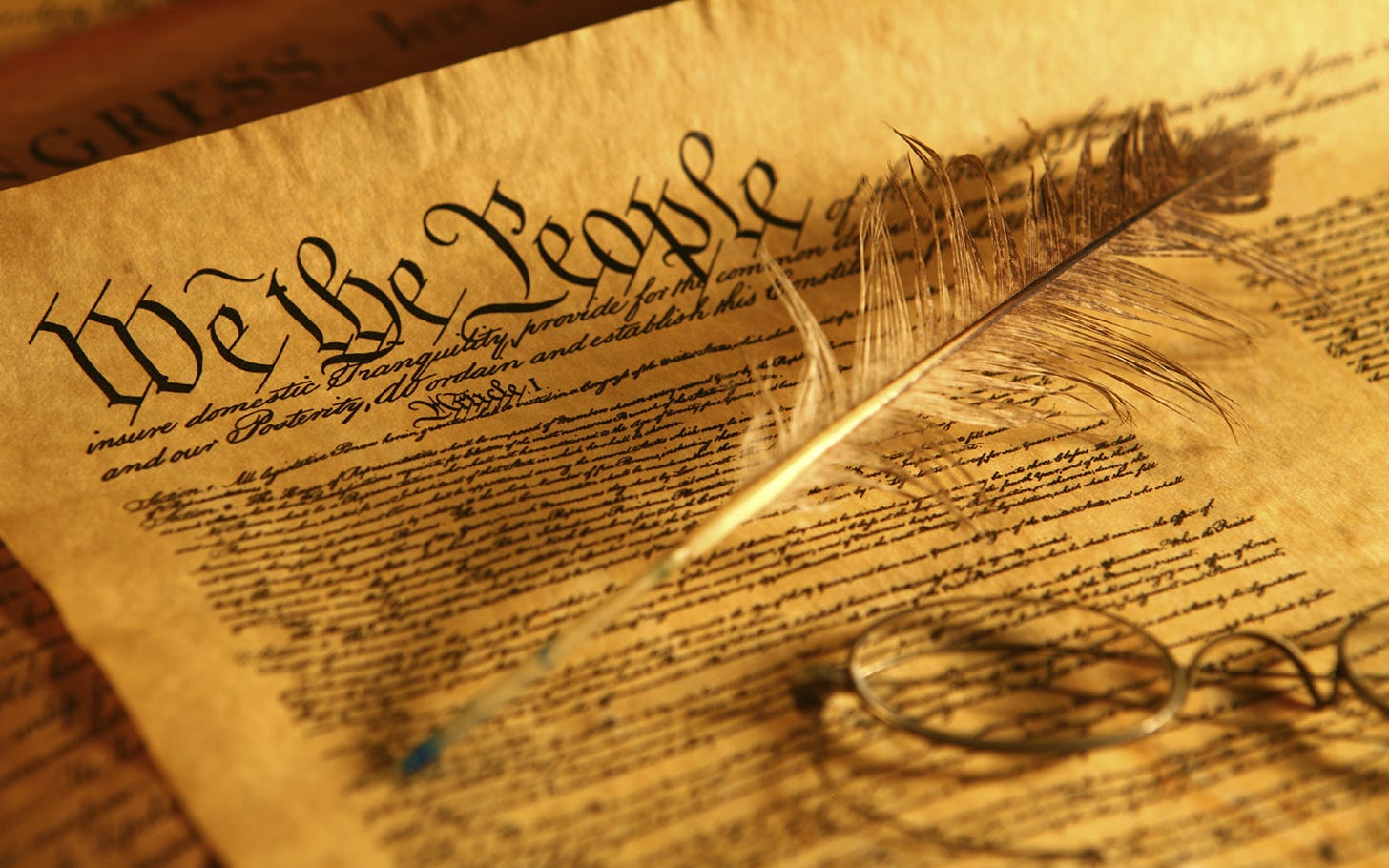Here, I try to figure out how a constitution could be designed so that it might effectively limit the government.*
[ *Based on: “Can Constitutions Limit Government?” in The Oxford Handbook of Freedom, ed. David Schmidtz and Carmen Pavel (Oxford University Press, 2018), pp. 350-66. ]
1. Constitutional Failure
Years ago, before the Great Awokening, American high school students used to be taught the virtues of their system of government. They would be taught that America is a land of freedom, largely because our Constitution strictly limits the powers of government and protects key rights of the people. (Today, of course, students are just taught that their country is evil.)
In that era, I suppose many people believed that story. I suppose this was because they never actually looked at the Constitution. If you actually look at it, and you also have a passing familiarity with the doings of the U.S. government, it’s pretty hard not to notice that nearly everything the government does is blatantly unconstitutional. If you don’t know what I mean, check out:
Article 1, Section 8. This is an exhaustive list of the powers of Congress (it’s 429 words). Almost everything on that list is something the government does (it coins money, has a post office, has a navy, etc.). But there are many other things the government does that are not on the list.
Amendment X: “The powers not delegated to the United States by the Constitution, nor prohibited by it to the states, are reserved to the states respectively, or to the people.”
You will notice that only a small fraction of federal laws are related to any of the items listed in Article 1, sec. 8, and in general, only a small fraction of the government’s activities are authorized by the Constitution. And I don’t mean according to some weird, radical libertarian reading of the Constitution; I mean according to the plain meaning of the text, as any normal person who was trying to read it faithfully could see.
A good illustration is the case of Wickard v. Filburn (1938), in which the Supreme Court decided that the federal government could regulate how much wheat a farmer may grow to feed hogs on his own farm (where none of the grain leaves the farm), because this is part of Congress’ Constitutional power to “regulate interstate commerce”.
2. Why Did it Fail?
a. Enforcement
One reason the Constitution has failed to restrain government is that there is no one to enforce the Constitution, other than the government itself. This is similar to a system in which you appoint bank robbers to police bank robbery. You’re dreaming if you think anyone is going to enforce the law against themselves.
b. What about checks & balances?
The famed “checks and balances” don’t work because the branches of government have no incentive to restrain each other. They can all profit by growing the government at the expense of the freedoms of the people.
Nor is there any reason to think a branch of government would only use its powers to restrain other branches from violating the Constitution, rather than using its powers to stop other branches from doing their job or to ensure that other branches do violate the constitution.
The Wickard case mentioned above was decided by 9 judges, 8 of whom had been appointed by Franklin Roosevelt, who happened to be the same President who had created the very law whose constitutionality was in dispute. Roosevelt deliberately appointed only yes-men who would rubber stamp his agenda. Those judges, of course, also had to be approved by the Senate, which had also passed that same law.
This illustrates a general problem: The President’s power to appoint Supreme Court justices, and the Senate’s power to approve or reject them, are supposed to be used to ensure that we have only good judges on the Court (according to the High School Civics Theory of Checks and Balances). But in actual fact, these powers are used to ensure that no judge is ever appointed who looks like he might be inclined to effectively limit the powers of the President or the legislature.
c. The self-image of government
Governments think their job is to “make laws”. If you hire a full-time “lawmaker”, then they’re going to keep coming up with new laws to make, no matter how many you already have. But there is no one who thinks their job is to remove laws, so unnecessary laws accumulate year after year.
d. Punishment
Even when the Supreme Court occasionally strikes down some government action as unconstitutional, there is no punishment for violating the Constitution. Hence, there is no disincentive for government officials to try again.
e. The difficulty of challenging laws
You can’t just bring a case against the government because you think they’ve violated the Constitution. You have to “have legal standing”, which means you have to be able to show that you have personally been harmed by the government’s violation.
Consider the case of Nasser al-Awlaki, who filed a federal lawsuit in 2010 to prevent the Obama administration from assassinating his son, Anwar al-Awlaki. The Administration had claimed that Anwar (who had joint U.S. and Yemeni citizenship) was a terrorist (though they declined to present any evidence of this) and they targeted him for assassination.
You might think that the President declaring someone a criminal and then executing him, with no judicial process, would be unconstitutional. If that’s not unconstitutional, I don’t know what is. But the courts refused to rule on this, because they said Nasser “lacked standing” to file the suit, because he was not himself the one who was going to be executed. And thus the extra-judicial assassination program was allowed to go forward.
f. Ignorance
Most Americans have no idea what the Constitution says and thus don’t notice (or care) when it is violated.
3. Where the Constitution Didn’t Fail
You can distinguish three kinds of Constitutional provisions:
Substantive provisions: These state what kinds of laws the government can and can’t make. These have been almost completely ignored (except for some of the Bill of Rights).
Structural provisions: These describe the structure of the government. The government is divided into three branches, the legislature is divided into a House and a Senate, etc. These have generally been faithfully followed.
Procedural provisions: These describe the procedures for passing laws and such. They need a majority of both houses of Congress, 2/3 majority to override a Presidential veto, etc. These are also followed.
So if we want an effective constitution, the key is to better design the structures and procedures, rather than relying on substantive constraints.
4. Toward a More Effective Constitution
You might think that many of the government’s Constitutional violations are actually good policies. So why care about having an effective Constitution?
Briefly, the answer is that, whether or not you agree with the substantive constraints that the framers tried to build into the actual U.S. Constitution, virtually everyone agrees that there should be some constraints on government power. History has shown us many horrifying episodes of unconstrained governments abusing their people, up to and including murdering tens of millions of them. So whatever constraints you believe in, you should be interested in how they could be made effective, and you should be worried by the fact that the U.S. government has been able to just blatantly ignore the substantive constraints of its own Constitution.
Here are some provisions that might have been more effective at restraining government than the actual U.S. Constitution has been:
a. Supermajority rules
Every new law should require a 2/3 majority for passage. Rationale: All or nearly all laws are coercive. But there should be a presumption against coercion in general. If only slightly over half of the legislators think a law should be passed, that doesn’t overcome the presumption. The 2/3 requirement still allows the government to get obviously necessary laws passed (e.g., the statute against murder) but doesn’t enable it to coercively intervene in the cases where it is most likely to be wrong, namely, where there is a lot of disagreement about the proposed law.
b. Negative legislature
There should be a separate, “negative” legislative body (also elected by popular vote, just like the regular legislature) whose sole power is to repeal laws. Because this would be their only job, they would spend their time looking for unnecessary laws.
c. Constitutional court
There should be a separate court dedicated solely to enforcing the Constitution. There should be a special prosecutor’s office solely for prosecuting potentially unconstitutional government actions. These cases should be decided by juries of ordinary citizens, to avoid pro-government bias.
d. Punishments
The Constitutional Court should have the power to assign sentences to government officials who violate the Constitution, including fines, removal from office, and even jail terms.
5. Conclusion
Libertarians fall into two camps: minimal state libertarians and anarchists. One of the arguments for anarchism (but not the only one!) is that limited government is infeasible: people have already tried it, and it didn’t work.
But maybe it could work. I do not know if the above measures would really work, as they have not been tried. But it seems as if they’d have a good chance of working better than what has been tried so far.
I still think there are other good reasons for favoring anarcho-capitalism. But if you’re not ready for anarchy yet, try my improved version of limited government.







"including murdering tens of millions of them."
The only candidate I can think of is Mao. Neither Hitler, Stalin or Pol Pot killed tens of millions. Mao was responsible for the deaths of tens of millions, but mostly through starvation due to bad government policy, which wouldn't normally classify as murder.
Am I missing someone? I take "tens of millions" as meaning at least twenty million.
The obvious problem is that those who would be in charge of making such changes are the same ones that benefit from the status quo. How do we get to the point where everyone (or enough relevant people) feel that they have more to lose from allowing unconstrained government than they have to gain from seeking exceptions for themselves?